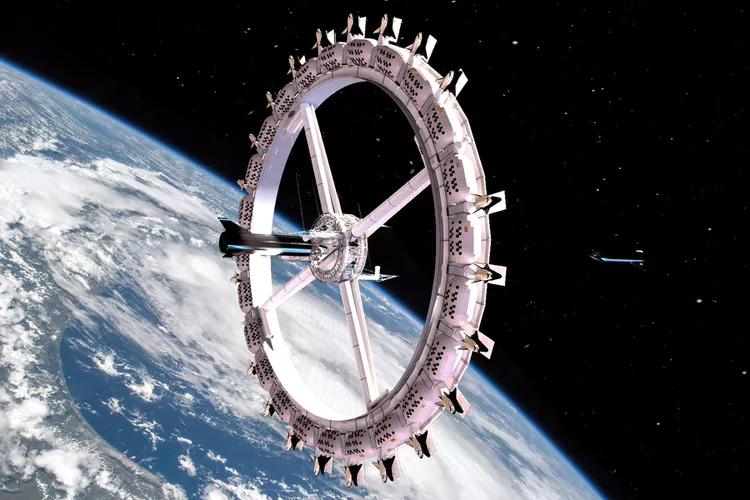Summary of Content
Space Tourism: A New Era
Space tourism is no longer the stuff of science fiction; rather, it’s just around the corner. Aside from private missions to space—like 2021’s Inspiration4, during which members of the general public spent a few days in a SpaceX vehicle circling the Earth, and the upcoming DearMoon mission, slated for 2023, as civilians circle the moon—there are also a few space “hotels” in the works. These developments mark a significant shift in travel experiences.
Orbital Assembly: Voyager and Pioneer Stations
One such project is Orbital Assembly’s Voyager Station, which is currently scheduled to begin construction in 2026. It aims to welcome guests by the end of the decade. Additionally, the corporation is slated to launch Pioneer Station, a smaller gravity-enabled “space-based business park,” which is expected to be fully operational as early as 2025.
Taking inspiration from science fiction films like “2001: A Space Odyssey” and “Interstellar,” both Voyager Station and Pioneer Station will utilize centrifugal force to create artificial gravity. The layout of each space station resembles that of a Ferris wheel, spinning to simulate gravity within their compartments.
Guest Experience at Space Hotels
While these space hotels may appear unconventional compared to terrestrial accommodations, the rooms and amenities aboard each station will feel familiar to regular travelers. Voyager Station, for example, will feature luxurious accommodations for up to 400 guests. Guests can expect:
- Villas that can be purchased as vacation homes
- Themed restaurants and dining options
- Concert venues and bars with views of Earth
- State-of-the-art gyms and health spas
In essence, Voyager Station aims to offer a high-end resort experience—just in space.
Conversely, Pioneer Station will accommodate up to 28 guests and primarily serve as a blended commercial, research, and tourism facility. Its design promotes functionality without compromising comfort.
The Future of Space Hotels
Due to the presence of artificial gravity, guests will enjoy regular activities such as eating and sleeping without the challenges of zero gravity, which currently affects astronauts aboard space stations. According to Orbital Assembly’s chief operating officer, Tim Alatorre, this development is set to transform space into a dreamy escape for travelers.
Originally revealed in 2019 as the Von Braun Rotating Space Station, the ambitious plans have undergone rebranding due to the historical implications associated with Wernher Von Braun. Despite delays attributed to the Covid-19 pandemic, expectations for the completion of these groundbreaking hotels remain optimistic.
Moreover, new developments in space hotels are continuously emerging, with other residential stations, like Axiom Space’s Axiom Station, also in progress. The concept of space tourism is rapidly evolving, and the prospects for Voyager and Pioneer Stations suggest a bright future for travelers eager to experience life beyond Earth.
Alatorre emphasizes the transformative impact that spending time in space could have on travelers when they return to Earth, enhancing their appreciation and perspective. As space travel continues to evolve, the journey is just beginning.




